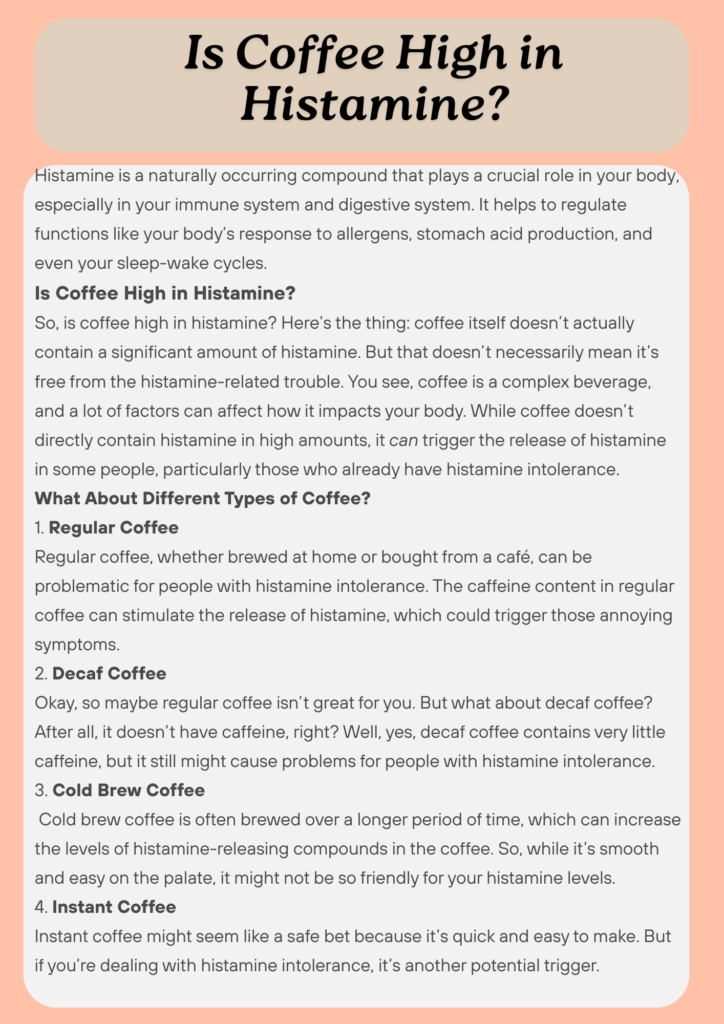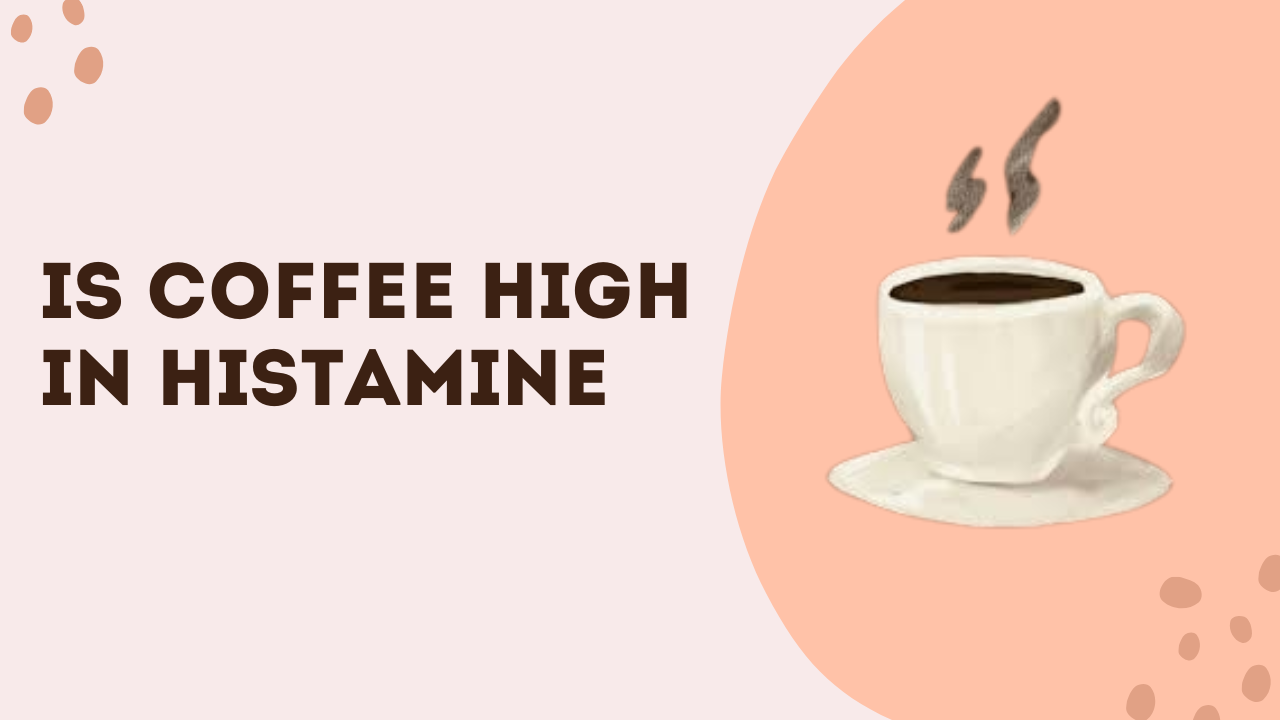When it comes to coffee, many of us are hooked on that daily cup (or cups) that give us that much-needed energy boost. But for some people, coffee can be a bit of a problem, especially if you’re dealing with histamine intolerance. You might be wondering: “Is coffee high in histamine?” Well, that’s exactly what we’re going to talk about today. Grab a cup of coffee (or tea, if you prefer), and let’s explore this topic in detail!
Histamine intolerance is a condition where your body is unable to break down histamine properly, leading to symptoms like headaches, hives, and digestive problems. People with histamine intolerance often have to avoid certain foods and drinks, so you might be wondering if coffee is on the “avoid” list. In this article, we’re going to take a closer look at the relationship between coffee and histamine, whether it’s a trigger, and what you can do about it. But first, let’s talk a little bit about histamine and why it can be a problem for some people.
What is Histamine and Why Should We Care About It?
Before we dive into coffee, let’s talk about histamine itself. Histamine is a naturally occurring compound that plays a crucial role in your body, especially in your immune system and digestive system. It helps to regulate functions like your body’s response to allergens, stomach acid production, and even your sleep-wake cycles. Sounds important, right? Well, it is!
The problem arises when your body can’t break down histamine properly. Usually, an enzyme called diamine oxidase (DAO) breaks down histamine, but if this enzyme isn’t working at full capacity (or if there’s too much histamine), that’s when you can start experiencing issues. The symptoms can vary but often include headaches, skin rashes, digestive problems, and even difficulty breathing in severe cases.
Now, why are we talking about histamine when it comes to coffee? Let’s get into that.

Is Coffee High in Histamine?
So, is coffee high in histamine? Here’s the thing: coffee itself doesn’t actually contain a significant amount of histamine. But that doesn’t necessarily mean it’s free from the histamine-related trouble. You see, coffee is a complex beverage, and a lot of factors can affect how it impacts your body. While coffee doesn’t directly contain histamine in high amounts, it can trigger the release of histamine in some people, particularly those who already have histamine intolerance.
But why does coffee trigger this response? Well, caffeine (the main active compound in coffee) can stimulate the production of histamine in the body. For people with histamine intolerance, this can be a bit of an issue. It’s not about the amount of histamine in coffee, but rather how coffee can make your body release histamine.
What About Different Types of Coffee?
Now, you might be thinking: “Okay, so coffee in general might be problematic for people with histamine intolerance, but what if I drink different types of coffee? Can I drink decaf? What about cold brew?” Great questions! Let’s break it down.
1. Regular Coffee
Regular coffee, whether brewed at home or bought from a café, can be problematic for people with histamine intolerance. The caffeine content in regular coffee can stimulate the release of histamine, which could trigger those annoying symptoms. Additionally, some studies suggest that coffee beans, especially those that are roasted darker, may contain compounds that increase histamine levels or promote histamine release. So, if you’re sensitive, regular coffee might not be your best friend.
2. Decaf Coffee
Okay, so maybe regular coffee isn’t great for you. But what about decaf coffee? After all, it doesn’t have caffeine, right? Well, yes, decaf coffee contains very little caffeine, but it still might cause problems for people with histamine intolerance. You see, even decaf coffee can contain other compounds that promote the release of histamine in the body. Plus, the decaffeination process itself might play a role in altering the chemical composition of the coffee, making it potentially worse for people with histamine sensitivity.
3. Cold Brew Coffee
Cold brew coffee has become super popular in recent years, and while it might be easier on your stomach due to its lower acidity, it could still pose an issue if you’re histamine sensitive. The reason? Cold brew coffee is often brewed over a longer period of time, which can increase the levels of histamine-releasing compounds in the coffee. So, while it’s smooth and easy on the palate, it might not be so friendly for your histamine levels.
4. Instant Coffee
Instant coffee might seem like a safe bet because it’s quick and easy to make. But if you’re dealing with histamine intolerance, it’s another potential trigger. Instant coffee can contain more biogenic amines, including histamine, due to its production process. So, while it’s convenient, it might be best to skip instant coffee if you’re sensitive to histamine.
Other Considerations: Acidity and Additives
Another thing to consider when it comes to coffee and histamine intolerance is the acidity of the coffee. High-acid coffees (like some light roasts or certain coffee beans) can irritate the gut, which could make histamine intolerance worse. The acidity may not directly affect histamine levels, but if your gut is irritated, it could be more difficult for your body to properly break down histamine.
Additionally, some coffee drinks come with added sugars, syrups, and creamers that may also contain histamine-releasing compounds. So, if you’re sensitive, it’s not just the coffee itself but everything else you’re putting in your cup that could cause problems.
What Can You Do If You Love Coffee But Have Histamine Intolerance?
If you’re a coffee lover but are struggling with histamine intolerance, you might be thinking, “Is there any hope?” Well, there are a few things you can try.
- Choose Low-Acidity Coffees – Some beans are naturally lower in acid, so opting for these might help reduce the irritation that triggers histamine release. Darker roasts often have lower acidity, though you’ll still want to keep an eye on the other factors we discussed.
- Try Smaller Amounts – If you really can’t live without your coffee, try reducing the amount you drink. Sometimes, smaller amounts of coffee will be less likely to cause a histamine response.
- Experiment with Alternatives – If coffee is really causing you trouble, you could try some alternatives, like herbal teas or mushroom coffee, which might be gentler on your body. These options tend to have less caffeine and might be better for those with histamine sensitivity.
- Monitor Additives – As we mentioned earlier, it’s not just the coffee but what you put in it. Opt for natural, non-histamine-releasing sweeteners, and avoid heavy creamers and syrups.
Final Thoughts
So, is coffee high in histamine? Not directly. But it can cause histamine to be released in some people, especially if they have histamine intolerance. If you’re one of those people, you might want to be cautious about how much coffee you consume and which types you choose. It’s all about experimenting and finding what works best for your body.
The good news is, you don’t have to give up coffee entirely (unless you really want to), but making informed choices about the type and amount of coffee you drink can help you enjoy your favorite drink without triggering those pesky histamine symptoms. Keep an eye on your body, and you’ll find a solution that works for you!
